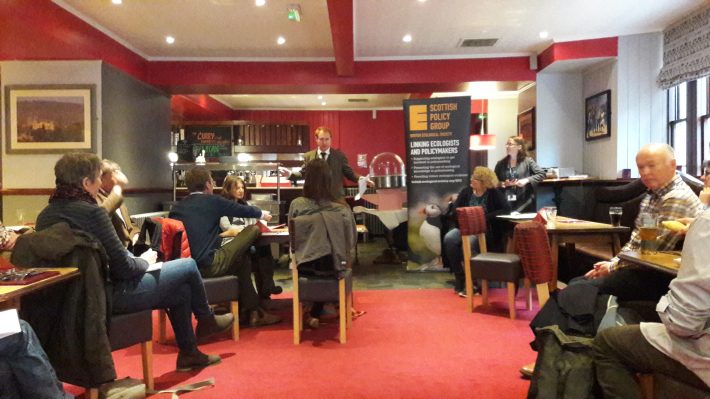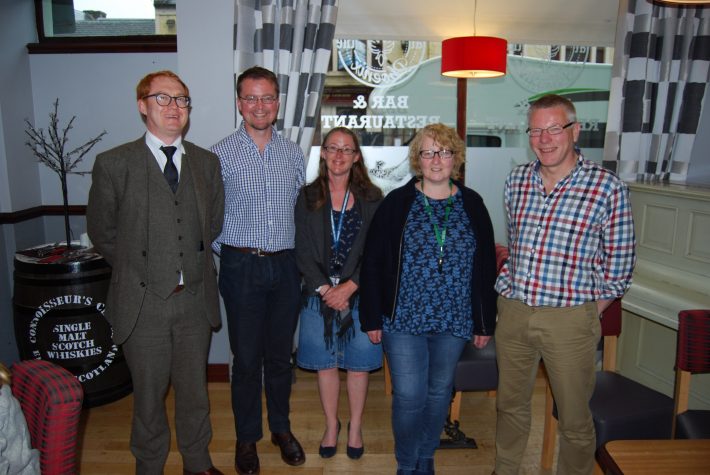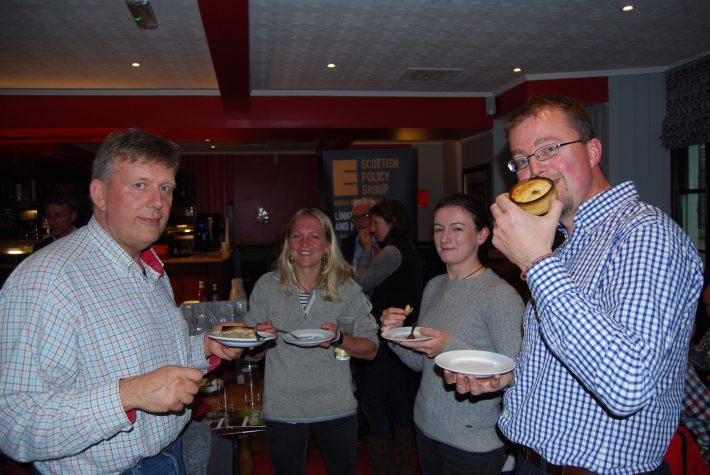“What does biodiversity success in 2020 look like?”
Take-home messages from the latest BES Scottish Policy Group (SPG) ‘Pie and a Pint event’ in Inverness 2018.

On May 21st, the city of Inverness played host to the latest BES SPG “Pie and a Pint” (PAAP) event. This is the second time a PAAP has been held in this northern city, and thanks to The Phoenix Ale House, it may have been the first to actually feature both pies and pints. In true Highland style, it rained continuously. However, this did not dampen the mood as policy enthusiasts from all ecological backgrounds gathered to discuss the question: “What does biodiversity success in 2020 look like?”
The free event started, as all should, with liquid refreshments (courtesy of the BES). With thirsts satiated (for now), delegates took their seats in preparation for the evenings activities to begin. After brief introductions by the BES SPG’s own Jeanette Hall, five invited speakers briefly and enthusiastically shared their perspectives on the evening’s question. These were: Paul Walton (RSPB), David O’Brien (Scottish Natural Heritage), Pete Mayhew (Cairngorms National Park), Siobhan McDonald (Scotland’s Rural College) and Jonathan Willet (a former Biodiversity Officer for the Highland Council).

Following this, and a brief break to grab another beverage, delegates were raring to contribute to the topic at hand. Splitting into groups, delegates rotated around four breakout sessions: 1) What is working well with the Scottish Biodiversity Strategy (SBS) to deliver the 2020 targets? 2) What hasn’t worked well in SBS? 3) Where should we go after 2020 (for strategy: aka governance and process)? 4) Where should we go after 2020 (for biodiversity)?
To detail the lively discussions had around these topics would take a full report, and the good news is we are working on one (watch this space). However, a few key themes did emerge from the evening. The first was the need for better education around biodiversity initiatives, inspired in no small part by the powerful imagery in the documentary series Blue Planet II, which has already spurred much behaviour change around plastics use. This stretched from the need for school based activities to more general public outreach campaigns, with the message and choice of media tailored to the needs of different target audiences.
Another common theme in the evening was the need to connect different stakeholder groups. The wants and needs of government, industry, private landowners and conservation organizations are likely to differ quite markedly. However, in order for Scottish biodiversity actions to be a success we need all of these groups to coordinate, cooperate and compromise. In those SBS activities that have worked well so far, this is exactly what happened. However, such actions require bridges to be built between the self-contained bubbles interest groups regularly self-organise into. Luckily, that is exactly what groups like the BES SPG are trying to do, as some noted on the evening:
“The important thing for me was that people with very different viewpoints were able to talk to each other in a friendly setting.
Beyond 2020 we will only succeed if all of us who care about biodiversity work together – farmers, foresters, conservation organisation staff, and most importantly people who just love nature.”– David O’Brien
Many other ideas and themes emerged throughout the night, for example, a concern that too much emphasis is placed on the economic value of biodiversity and sustainability. Questions were also raised about the geographical scale biodiversity targets and action plans operate at, with national and local frameworks potentially missing important regional or global patterns. The fast approaching Brexit date also loomed large over the evening, eliciting both concern and a little optimism: if done right, could Brexit allow for a radical overhaul of biodiversity legislation in Scotland, and UK as a whole? Keep your eyes peeled for the report, which will detail these and other discussions from the evening.
Finally, the PAAP wrapped up with a networking session over the much-touted pies (Scotch for the meat eaters and macaroni for the vegetarians). Not the fanciest meal perhaps, but always a crowd pleaser on a wet Highland night.

James Burgon is a member of the BES Scottish Policy Group Committee, a researcher at the University of Glasgow, freelance science writer and podcaster.
Like what we stand for?
Support our mission and help develop the next generation of ecologists by donating to the British Ecological Society.